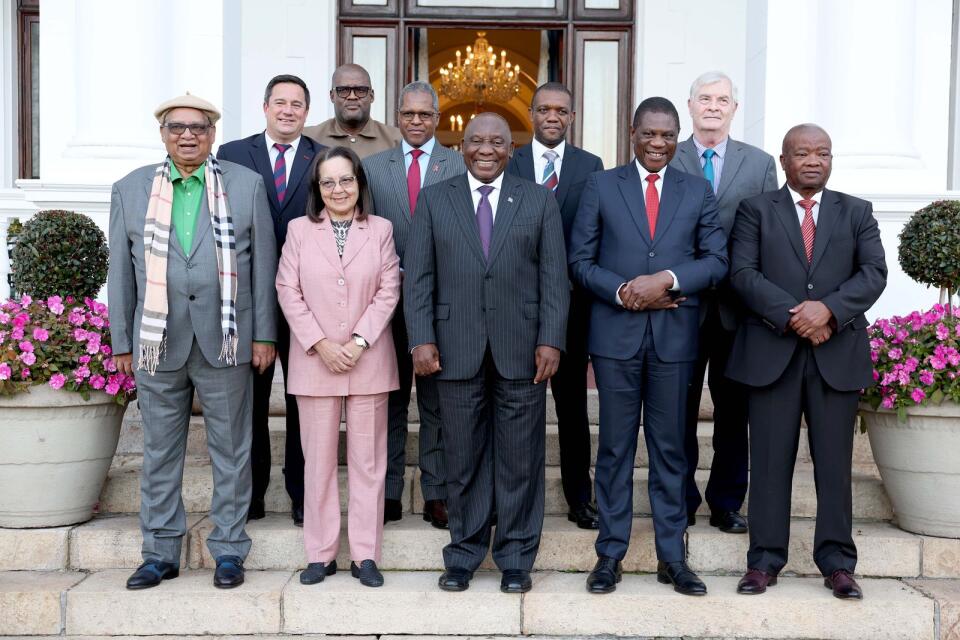President Cyril Ramaphosa with the Government of National Unity leaders at a dinner hosted by the President in Cape Town on September 11, 2024. If the GNU delivers what the ANC has failed to deliver, this will serve as proof that Africans cannot govern well unless they are subjected to white supervision, says the writer. Picture: GCIS
Prof. Sipho Seepe
ON his return from the World Economic Forum, President Ramaphosa had hardly found a moment to breathe when he found himself having to calm a brewing storm of discontent at home.
At the World Economic Forum, Ramaphosa waxed lyrical about the GNU: “Over the last few years, the South African government has been working closely with social partners in business and labour to address key national challenges and drive inclusive growth…This cooperative culture and approach was taken to a higher level with the establishment of the Government of National Unity following the elections we held in May last year. The Government of National Unity, made up of ten political parties, has been vital to stability and inclusive governance.”
Ramaphosa presented the GNU with pride, almost as a badge of honour. Unbeknown to him is that some of those who showed interest were befuddled and bemused by the incredulity of it all. How can a man who presided over a precipitous decline in his party’s electoral support continue to carry his head high with no sense of shame? In most democracies, leaders resign for much less. He would have been the butt of jokes. Not so in South Africa. Just as it was in the case of the appointment of Justice Raymond Zondo, unquestionably poor performance guarantees you the job. No wonder South Africa is described as a miracle country where sheer lunacy prevails.
Be that as it may, it didn’t take long for Ramaphosa’s exuberance to burst. The discontent arose with him finally signing the Expropriation Bill into law.
The culprits were not hard to find. They are comfortably perched in his cabinet of the so-called GNU. Leading the rebellion, Dean MacPherson, took to social media. He wrote. “As the minister of Public Works and Infrastructure, there will be no expropriation of private property without compensation on my watch. The guarantee of property rights under Section 25 of the Constitution is not up for debate and is non-negotiable.”
Not to be left behind, John Steenhuisen, joined the fray and accused President Ramaphosa of acting in bad faith. ” When you make decisions, and you don’t consult the parties in the coalition, without even giving a courtesy call to the leaders, knowing how contentious the Expropriation Bill has been, it is not being a good steward or a good partner of the GNU”.
The IFP and the Patriotic Alliance have also expressed their unhappiness after they were not consulted. In the broader scheme of things, these parties, like others in the GNU, are considered to be mere drum majorettes in the GNU. This past week, Helen Zille drove this point home in her press briefing.
“[Unlike other parties], we are not there by grace and favour of the president. We are there by grace and favour of the voters. The voters gave us the balance of power. And so, we go there to represent the three, 5 million people who voted for us…. We are in a coalition to share power… Two parties can bring down the government. And so, two major coalition partners in the GNU are the DA and the ANC.”.
This sense of public disquiet stands in glaring contrast to Ramaphosa’s repeated portrayal of the workings of the GNU. Arguably, the current imbroglio is to be expected and is likely to be a storm in a teacup. The ANC and the DA desperately need each other. The ANC whose sole existence centres around being in power cannot do so without the support of the DA. Ramaphosa’s ANC needs the DA to hold fire on the Phala Phala scandal.
Steenhuisen had written to “the United States Federal Bureau of Investigation, the FBI, to request that they investigate allegations of possible money laundering by the president, specifically we’ve requested that the FBI consider investigating the source of the funds and whether the money was brought into South Africa legitimately and declared to the appropriate authorities”.
All things considered, there is much ado about nothing regarding the Expropriation Act. Explaining what the Act is about, advocate Tembeka Ngcukaitobi, author of a recent book, Land Matters: South Africa’s Failed Land Reform and the Road Ahead, argues. “The power of expropriation is the power that is assigned by the constitution in terms of section 25 to the state. That power can be exercised in two instances. One is, what is called for public purposes the other is in the public interest… The limitation [of] this bill is that it is not a bill that is intended to address land reform. It is a bill intended to empower the state to acquire property in the generic sense, not only land, for the state’s usage, and that much is clear from sections 2 and 3 of the Act.”
The question arises then, beyond failure to consult, what is this brouhaha about? First, this self-created mini-crisis arises first from President Ramaphosa’s mixed messages. He has sold the idea of the GNU as the greatest South African innovation. In doing so, he has advanced the idea and spirit of partnership.
Partners consult each other on major developments. Had President Ramaphosa engaged his partners before signing the bill, the country would have been saved from having to witness this political circus. Instead, he chose to play to the ANC gallery.
Second, both the ANC and DA are being populist. Each wants to assure its constituency that it is not sleeping on the job.
Third, the ANC has not reconciled itself with the idea that it has not won elections. It wants to do as it pleases and to convince itself that it is not sharing power with the DA. Consistent with its written political script, Zille would use every opportunity to remind the ANC that they “must realise they don’t make all the decisions anymore. They didn’t win the election.”
Fourth, members of the GNU have different agendas pursued which are antagonistic. None wishes the other to do well. This difficulty has expressed itself in the contradictory and hostile postures taken by the Minister of Public Works, Dean MacPherson, and his deputy Sihle Zikalala. In a predictable way, President Ramaphosa thinks that this entanglement would somehow resolve itself. In addition, MacPherson made it abundantly clear that he only takes orders from the DA.
The DA is on record in wanting the ANC gone. The DA had long declared that it needed Ramaphosa to bring the ANC to its knees. As early as 2019, Helen Zille the Federal leader of the DA knew what she wanted. She averred. “I’d rather make tough demands on Cyril Ramaphosa’s ANC and force them to unite under them, and go into coalition with them, and make strict conditions for them than go into coalition with anyone else.”
The DA’s participation in the GNU is part of the plan. President Ramaphosa is its best bet in achieving this. Whichever the GNU pans out, the DA wins.
If the GNU delivers what the ANC has failed to deliver, this will serve as proof that Africans cannot govern well unless they are subjected to white supervision. This would feed the monster of white supremacy. Should the GNU fail, the DA can always claim to have not been in charge. What is not in doubt though is the fact that the ANC has squandered every chance in the last thirty years to bring a better life for all.
* Professor Sipho P. Seepe is a Higher Education and Strategy Consultant.
** The views in this article do not necessarily represent the views of The African.





